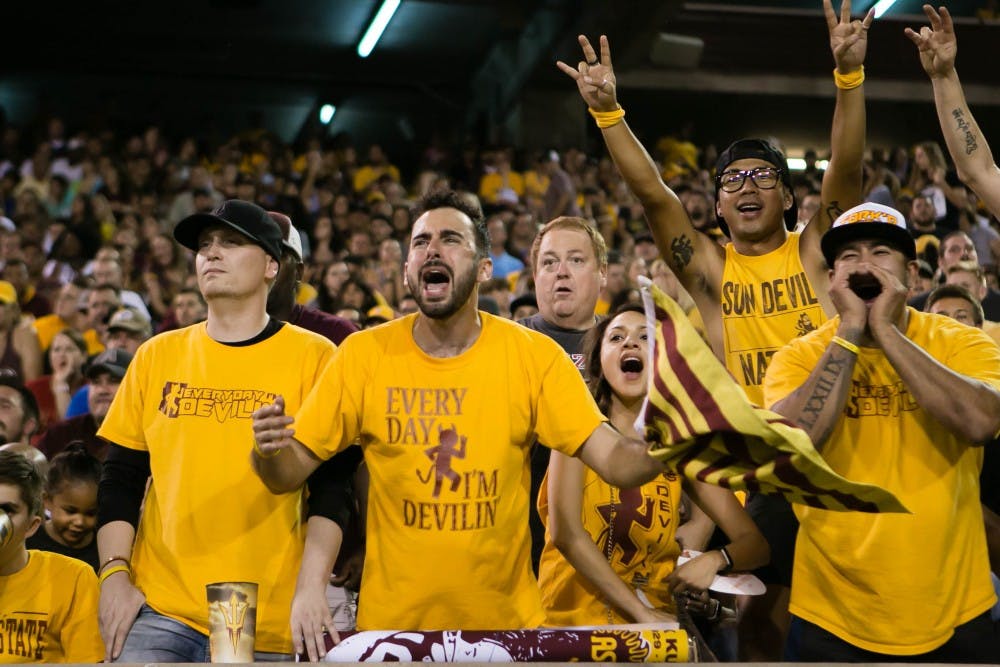Despite having four major sports teams and being the fifth-largest city in the U.S., Phoenix is not a good city for sports fans.
It is not due to a shortage of teams and venues, however. The Diamondbacks, Suns, Cardinals, Coyotes and even ASU, all call the Phoenix area home. However, they lack the die-hard fan bases other big-market cities possess.
That is not to say both professional and ASU teams do not have loyal fans who have been with them from the start, but, as a whole, the teams tend to struggle with attendance — no matter how well they are playing.
For example, the paid attendance for the game in which the Diamondbacks clinched their spot in the 2017 postseason was only 31,539 – over 17,000 people under full capacity.
It is unrealistic to think the D-backs should sell out every game, but they should at least be able to fill more than 64 percent of the stadium for a game of such magnitude.
The same notion applies to the other three professional teams.
The Suns have not ranked in the top 10 in average fan attendance since 2007, and both the Cardinals and Coyotes consistently rank in the bottom third of their respective leagues with attendance each year.
“Phoenix is a very transient city,” Peter Madrid, adjunct journalism professor at ASU and former newspaper sports editor, said. “You get a lot of people moving here. We are in the Sun Belt. We’re a retirement community.”
Madrid recalled a game he attended at Sun Devil Stadium when the Cardinals first moved to Arizona and were playing the Minnesota Vikings. He was amazed to see more fans in the stands supporting the Vikings than the Cardinals.
“I think it’s interesting that you can go around town and find that there are more bars that cater to other teams,” Madrid said. “I can’t think of one bar I would go to and say, 'this a Cardinals bar.'”
Phoenix struggles to generate a huge number of local fans because so many people move to Arizona and bring their love and passion for their hometown teams with them. The locals who do support the Arizona teams are outshined by outside fan bases.
“You can kind of get an idea that fans are more drawn to teams they can call their own and have an identity with,” Madrid said.
Arizona is a relatively young professional sports state, too, compared to other states like Ohio or Pennsylvania.
Aside from the Suns, which began playing in Phoenix in 1968, the Cardinals, Coyotes and Diamondbacks all came to the valley within the last 30 years.
Anyone born in Arizona before the 1980s who was not a basketball or Suns fan did not grow up with a local team to root for.
ASU deals with similar issues regarding college fans. Unless they graduated from ASU or have a connection in some other way, an average fan typically is not going to gravitate toward the Sun Devils when there are more storied programs and teams to follow.
And even if they do have a connection, it is no guarantee they will show up.
Many ASU students are not fans of the local professional teams, either. They support ASU, of course, but usually have big-league teams they already root for, so the chances of them switching teams are slim.
Perhaps something can change regarding fan support down the road, but it is difficult to visualize anything significant happening in the near future.
People are only going to continue moving to Phoenix and bringing their non-Arizona team allegiances with them, so it is up to the locals to get behind their hometown teams and make Phoenix the great sports city it has the potential to be.
Reach the columnist at Steven.Slobodzian@asu.edu or follow @PSlobodzianASU on Twitter.
Like The State Press on Facebook and follow @statepress on Twitter.
Editor’s note: The opinions presented in this column are the author’s and do not imply any endorsement from The State Press or its editors.
Want to join the conversation? Send an email to opiniondesk.statepress@gmail.com. Keep letters under 500 words and be sure to include your university affiliation. Anonymity will not be granted.




